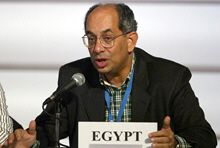
Typical street scene in Santa Ana, El Salvador. (Photo: iStock)
IMF Survey: Boutros-Ghali Is First IMFC Head from Emerging Markets
October 6, 2008
- Egyptian Finance Minister to head IMFC for period of up to three years
- Committee meets twice a year to set IMF's political direction, priorities
- Boutros-Ghali is first IMFC head from emerging market, developing countries
Egyptian Finance Minister Youssef Boutros-Ghali has been selected as the new Chairman of the International Monetary and Financial Committee, which sets the IMF's political direction and overall policy priorities.

New IMFC Chairman Boutros-Ghali: held ministerial positions in international cooperation, economic affairs, foreign trade (photo: Yuri Cortez/AFP)
IMF'S POLITICAL OVERSIGHT
Boutros-Ghali is the first IMFC head from emerging market and developing countries, and succeeds former Italian Finance Minister Tommaso Padoa-Schioppa, who resigned in May 2008.
Boutros-Ghali will head the IMFC at its next session during the 2008 IMF-World Bank Annual Meetings in Washington D.C. October 10-13. He has accepted the IMFC chairmanship for a term of up to three years.
Boutros-Ghali has been a member of the Egyptian government since 1993. Prior to becoming Minister of Finance in July 2004, he held a range of ministerial positions in the areas of international cooperation, economic affairs, and foreign trade. Boutros-Ghali has an intimate knowledge and first-hand experience of the Fund and its relations with member countries, both as a former IMF staff member and as chief negotiator of Egypt's fundamental reform programs implemented with IMF support in the late 1980s and early 1990s.
The 24-member IMFC typically comprises finance ministers and central bank governors from the same countries and constituencies as are represented on the IMF's Executive Board. The panel has operated since September 30, 1999 following a resolution of the IMF Board of Governors.
Stronger role
The 1999 resolution transformed the Interim Committee of the Board of Governors on the International Monetary System (usually known simply as the Interim Committee)—established in 1974—into the IMFC. The change signified a strengthening of the role of the primary advisory committee of the Board of Governors. The IMFC advises the Board of Governors on supervising the management and adaptation of the international monetary system and dealing with sudden disturbances that might threaten the stability of the system. The Committee deliberates on the principal policy issues facing the IMF.
As with the Interim Committee, the IMFC usually meets twice a year—before the IMF-World Bank Annual Meetings in September or October and at the institutions' Spring Meetings, which take place in April.
In line with the selection of the previous 16 chairmen of the IMFC and its predecessor, the Interim Committee, the process of selecting the Chair involves consultations among IMFC members at the level of IMF Executive Directors and in capitals of member countries until a consensus on a new IMFC Chair is reached.
Comments on this article should be sent to imfsurvey@imf.org


